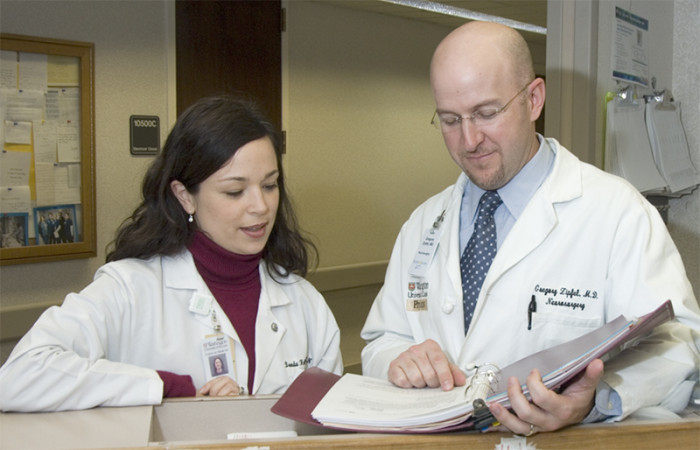Antibiotic evaluated for reducing brain injury due to bleeding
Investigators at Washington University are studying the use of the antibiotic minocycline to prevent delayed injury in patients with brain bleeds

Neurosurgeon, Gregory Zipfel, MD, (right) is studying the effects of the antibiotic minocycline on patients with brain bleeds.
In the new research, investigators are studying the role that an enzyme, matrix metalloproteinase (MMP)-9, plays in vasospasm and what effect minocycline has on MMP-9 and vasospasm. Previous studies have shown that levels of MMP-9 in the spinal fluid of patients with subarachnoid hemorrhage are elevated and suggest that these elevated levels may correlate with vasospasm development.
To test this theory, neurosurgeon Gregory Zipfel, MD, and colleagues knocked out, or inactivated, the MMP-9 gene in a mouse model of resubarachnoid hemorrhage. The knockout mice developed less severe vasospasm and had better neurological outcomes than mice with MMP-9 present.
“We think this is the strongest data to date that MMP-9 is involved in vasospasm after subarachnoid hemorrhage,” Zipfel says.
The next step was to identify a drug that could block MMP-9’s adverse effects in the brain. The investigators decided to study the tetracycline derivative minocycline, a known MMP inhibitor. Using their mouse model of subarachnoid hemorrhage, they found that the drug reduced the incidence of vasospasm and improved outcomes. The results were similar in a rabbit model of the condition.
Safety testing in patients
The investigators are now conducting a phase I clinical trial to determine whether minocycline treatment is safe in human patients with subarachnoid hemorrhage and whether it reduces MMP-9 levels in the spinal fluid and blood. The trial will enroll 12 patients.
If the trial is successful, the team will conduct a phase II study to look not only at safety and MMP-9 levels but also at whether the incidence of vasospasm is reduced in patients receiving minocycline.
“If we start to see that minocycline is safe and reduces MMP-9 levels and we have signs in phase II that the incidence of vasospasm is lower, then we will design a multicenter phase III trial to look at the long-term neurologic outcomes of minocycline treatment,” Zipfel says. “Our long-term goal is to improve outcomes after subarachnoid hemorrhage.”







